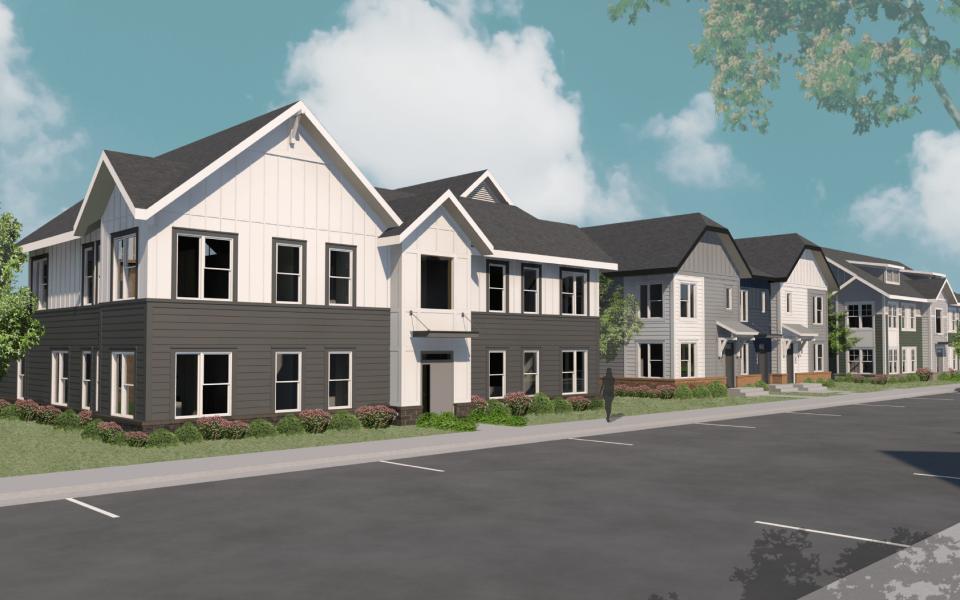Featured photo: HAWS plans to build 81 new units on the east side of Highland Avenue, between 11th and 12th Streets. (courtesy photo)
The Housing Authority of Winston-Salem’s ultimate goal is 400 new units across the city. The first phase, though, is to build 81 new units on the east side of Highland Avenue, between 11th and 12th Streets.
Winston-Salem is one of several cities to receive grants from the US Department of Housing and Urban Development’s Choice Neighborhood Initiative. Among those cities are Fort Worth, Texas, where the city is redeveloping a 174 unit mixed-income housing community, and Seattle, where the city is increasing the number of units in one location from 561 to 5,000.
The initiative is meant to allow wide-scale revitalizing in these communities. Winston-Salem received $30 million, which the city plans to use to construct and renovate housing units around the Cleveland Avenue area.
Fewer than 40 communities across the countries have been awarded these grants, with Winston-Salem being one of the smallest cities.
“HUD recognizes the capacity the housing authority and city have to successfully implement the ambitious redevelopment project, and has assembled a strong set of partners with which to do so,” said HUD in a statement to Triad City Beat. “The overall project will create a new-mixed income housing community as part of a larger neighborhood transformation for Northeast Winston-Salem.”
An estimated 44 of the 81 units will be either market rate or workforce/affordable housing. The remaining 37 will be for people with housing choice vouchers. Construction should begin in March of this coming year and the units should be ready for people to move in by June 2023.
“We’re excited to help create some high-quality affordable options to people,” said Grant Duffield, the Choice Neighborhood Initiative project director at HAWS, of the CNI grant.
“It really speaks to an understanding of a need that exists and the success potential. HUD is extremely selective in their grants. The housing authority and the city applied for this grant four years running before we were finally rewarded.”
The units are large, white houses with white interiors. The apartments open up into the living rooms, which are separated from kitchens by a bar. The kitchens each come with appliances, like a refrigerator, microwave and stove.

HAWS hopes to eventually create 244 new units of public housing on this site, which will take until 2026 or 2027. They anticipate 406 total units across Winston-Salem by the end.
In addition to the existing grants, the city, local schools, private partners and nonprofits have all committed to contribute to the project, about $35 million total.
“Some of that will be market rate housing, about 30 percent, and 21 percent will be workforce available housing,” said Duffield. “After that, a little less than 50 percent will be for housing vouchers.”
The motion to start on these units passed unanimously during a city council meeting on Nov. 1. Council had previously met about this same development project, asking HAWS to come back with more details. Petitioners from HAWS were present to make a statement, but because no one was in opposition to the motion they did not speak.
Members of Winston-Salem city council have been excited about this project for a while, approving the grant application offering support for the project. The building will be completed in the east ward, which is the jurisdiction of council member Annette Scippio.
Scippio was present at a small community meeting on Oct. 11 with HAWS to hear more about the project.
“Many of the community homeowners and representatives came to that meeting and I think we got the clarity that they needed for what is going to happen at this site,” she said in the council meeting.
The chosen property is the former site of Brown Elementary School, which operated until 1984. The site later became a local church. For now, the building is empty. HAWS acquired the property in 2014 and had initially planned to turn it into apartment living for senior citizens.
The current project in total will cost about $24 million, much of it covered by the HUD grant, but some of which will come from state tax credits and some from bank debt. The remaining HUD funds will go to redeveloping the existing Cleveland Avenue Homes site.
Join the First Amendment Society, a membership that goes directly to funding TCB‘s newsroom.
We believe that reporting can save the world.
The TCB First Amendment Society recognizes the vital role of a free, unfettered press with a bundling of local experiences designed to build community, and unique engagements with our newsroom that will help you understand, and shape, local journalism’s critical role in uplifting the people in our cities.
All revenue goes directly into the newsroom as reporters’ salaries and freelance commissions.


Leave a Reply